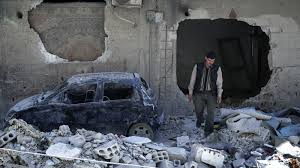A coalition of Syrian and international civil society organizations, alongside victims’ associations, has lauded the efforts of French judges who have recently issued arrest warrants for Syrian President Bashar al-Assad and other senior officials, accusing them of chemical weapon attacks that killed over 1,000 civilians in Douma and Eastern Ghouta in August 2013.
The warrants target not only President Assad but also his brother Major General Maher al-Assad, General Ghassan Abbas, director of the Syrian Scientific Studies and Research Center (SSRC), and General Bassam al-Hasan, a presidential advisor. These actions underscore a significant movement towards accountability for these atrocities, which are documented violations of multiple international laws, including humanitarian and human rights laws.
Syria Criticizes U.S. Human Rights Record and Rejects Its Authority to Judge Other Nations
However, controversy arises with the French National Anti-Terror Public Prosecutor’s Office challenging the warrant against Assad, citing his immunity as a sitting head of state. This decision has sparked intense criticism from the involved organizations, which argue that the erosion of state immunities over recent decades should extend to Assad, preventing impunity for international crimes such as war crimes and crimes against humanity.
The group is now calling on the French government to uphold the independence of the judiciary and to reject Assad’s immunity from prosecution in France. They emphasize the importance of the French leadership in the International Partnership against Impunity for the Use of Chemical Weapons and the contradiction posed by the Prosecutor’s challenge.
The statement from the organizations ends with a call for a resolute international effort to enforce the French arrest warrants and to affirm a universal commitment to justice for the use of chemical weapons, emphasizing that “the use of chemical weapons is forbidden, and all perpetrators will face justice.”
This judicial action and the international civil response could represent a pivotal moment in the global fight against impunity for the use of chemical weapons.


